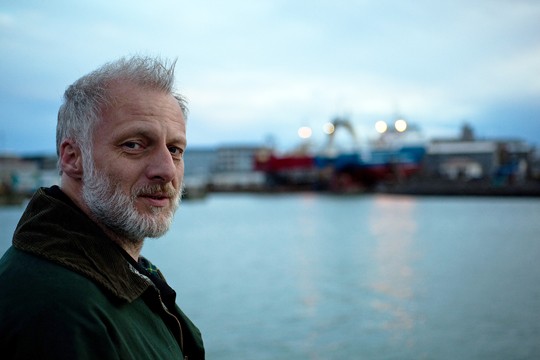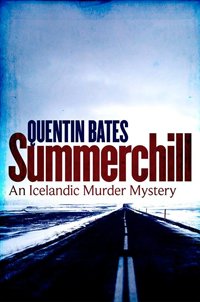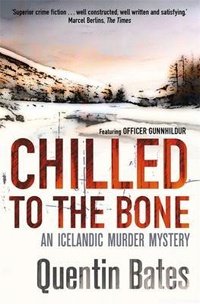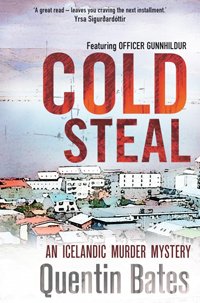
Quentin Bates moved to Iceland at the end of the 1970s for a gap year which turned into a gap decade, merrily acquiring a new language, family and profession over there. As well as being a commercial fishing expert, he is the author of a series of crime novels featuring Officer Gunnhilder (Gunna) Gisladottir of the Reykjavik Serious Crimes Unit, and from that series we’ve previously reviewed Cold Steal and Chilled to the Bone. He is also the translator of Ragnar Jonasson‘s novel Snowblind, recently published by Orenda Books – watch for our review shortly. As though all that weren’t enough, Quentin Bates is the co-founder of the Iceland Noir crime festival. Now based back in England, his latest publication is an Icelandic crime novella called Summerchill, and we decided now is a good time to ask him about his work.
How do you feel about being known as a Scandibrit?
I’m very happy to be one. Barry Forshaw coined the expression to describe the small band of outsiders who set their fiction in Nordic countries, but in reality there are more of us than just me and Michael Ridpath who write about Iceland. There’s Torquil Macleod, who sets his books in southern Sweden, Grant Nicol is a New Zealand author now based in Reykjavik Iceland, and the late James Thompson uses Finland as his setting. Jan Costin Wagner from Germany also sets his work in Finland. There are probably more of us, and we’re not all Brits…

What inspires you about Iceland?
It’s difficult to say why Iceland works so well. I know the place better than many outsiders: while it looks lovely from the outside, there are some dark undercurrents there that you have to know the country well to be able to identify. Everywhere has a dark side and Iceland is no exception, but it’s not easily visible.
Iceland has changed hugely since I first went there at the end of the 1970s. Back then you really were far away – no email, no fax, calling abroad meant booking a phone call at the local post office. Not everyone spoke English, while today it’s virtually impossible to find anyone under 40 who doesn’t speak English, which is the legacy of cable TV and the internet. Beer became legal in 1989 – no, I’m not joking! – and I remember beer day vividly.
Then there’s the political side of things… Iceland became a very wealthy country during the 90s and early 2000s, until it all came tumbling down in 2008 when the banks went haywire and people found out that it wasn’t real money after all. Iceland prides itself on being a classless society. In fact, it’s far from classless but the strata are quite subtle (and gradually widening), and it’s one of those aspects of the country that an outsider doesn’t notice.
How did you come up with such a no-nonsense yet loveable heroine such as Gunna?
Gunna just popped up and demanded attention. To begin with, when I was writing the first draft of what became Frozen Out, the original lead character was a male police officer. I realised that my male protagonist wasn’t working, he was too many clichés rolled together. So instead of re-writing him, I got rid of him and promoted the far more interesting lady who had been in his shadow. I guess Gunna brings together characteristics of half a dozen people I know, plus bits of me as well and more aspects of her that seeped in unconsciously from elsewhere.
She takes something of a step to one side in Summerchill, partly because writing the bad guys was such fun. It wasn’t a conscious decision to sideline Gunna, but Logi and the other dodgy characters seemed to come to life and it would have been a shame to not make the most of them. I also like to make more of the other detectives I’ve come up with, especially Helgi, who is a bald, male version of Gunna in many ways.

What’s the difference between writing a novella and a novel? Do you always know from the start if it’s going to be one or the other?
I seem to have three things on the boil most of the time. The theory is that one will become a novella, one will have enough meat on its bones to become a full-length novel and one will end up in the bin, but I don’t know from the outset which is which.
I like the novella format. It needs to be a little more linear, with less space for side-plots, so it’s a challenge to make it work. What I also like about the ebook novellas is that my publisher doesn’t take so much notice of what’s in there. That means I can bend the rules a little and get away with things that would be frowned upon in a proper book.
There’s also another idea that’s stewing quietly that I hope I’ll be able to finish before I’m old enough to get my bus pass. It’s something very different to what I’ve done so far and it’s maybe a little early to give too many details.
How did you become hooked on crime fiction?
I’ve always read crime, although not in huge amounts until I started writing it as well. I used to sneak Maigret and Martin Beck books from my Mum’s bookshelves when I was in my teens. So Simenon and Sjöwall & Wahlöö are enduring favourites that I keep returning to.
I have a huge admiration for Dominique Manotti. These are outstandingly sharp, brutal, intelligent crime books that carry a political punch as well. I only wish there were more of them in English. There’s also John le Carré, Richard Stark/Donald Westlake, Louise Welch, Edward Wilson, Barbara Nadel, Gunnar Staalesen, William McIlvanney, to name a few. Then there are the old-fashioned writers I grew up with such as Thomas Hardy, Rudyard Kipling and Somerset Maugham, also from my parents’ bookshelves.

In addition to your own writing, you are now busy translating, as well as organising Iceland Noir. How do you manage it all?
Iceland Noir has been pretty time-consuming, and it was something of a relief to give Shetland the 2015 slot for their festival. There are four of us behind Iceland Noir – it has to be a joint effort, as it would be a full-time job organising it on your own.
I expect Iceland Noir will be held every second year in future and we’d like to find partners to hold an event in the in-between years, such as Shetland this year. Hull has been mentioned as a possibility for 2017, as it’ll be a European City of Culture that year, plus it has a thriving community of crime writers, such as Nick Quantrill and David Mark.
This year I’ve been working on translating Ragnar’s books, which came about partly because my regular publisher was taken over so there was a gap in my publishing schedule. I’ve done a lot of translation stuff in the past, mostly dry technical material, so it was a challenge to get to grips with a novel and publisher Karen Sullivan at Orenda took a massive chance with Snowblind, taking on both a debut author and an untested translator. But the buzz around Snowblind has shown that she did the right thing.
What does it take to be a good translator?
Translation is a parallel skill – it calls for many of the same skills as writing your own stuff, as well as some very different ones. It’s crucial not to cross the line into editing, but there’s still a lot of interpretation required. An inspired translation can make a good book into something special, such as the late Bernard Scudder’s translations of Arnaldur Indridason’s early books, while a poor translation can ruin a good book. We were all determined not to let that happen with Snowblind, so it was very much a team effort. Karen really made Ragnar and me work hard, but it was also thoroughly rewarding to work with someone who has that level of dedication and fearsome attention to detail.
As for finding the time, I’m still wondering about that as well. Let’s say I don’t watch a lot of TV…
To find out more about Iceland Noir 2015, click here. You can read our guide to Arnaldur Indridason’s Detective Erlendur here.










